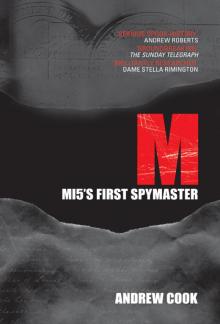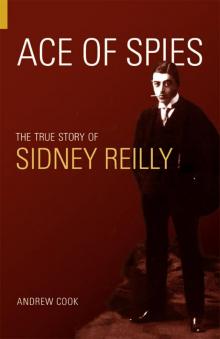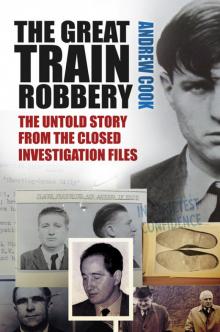- Home
- Andrew Cook
M Page 5
M Read online
Page 5
Harcourt knew that it would be politically unacceptable to put an official secret police chief in charge. Instead, by the end of the summer Jenkinson had become controller of Irish counter-terrorism in America, Ireland and continental Europe. On his recommendation Major Nicholas Gosselin looked after the same thing in cities like Birmingham and Manchester.
Jenkinson was a figure from an earlier age; a Machiavellian courtier, loyal mainly to Earl Spencer but essentially unsubtle. From his arrival in London onwards, Spencer and Harcourt received conspiratorial memos, often along lines suggesting that Jenkinson knew even more than he could possibly say but to reveal it just yet would mean certain death to his agents. Typical is this, to Spencer about P. J. Sheridan: ‘as Y.E. [Your Excellency] knows I have a little game going on with him in America and any false step here might spoil the game…’13 In Glasgow, where six months before, bombs had been left at a station and an aqueduct and a large gas-holder dynamited, Jenkinson urged Harcourt (in July 1883) that Gosselin be dissuaded from making a move until Jenkinson’s own scheme for trapping the culprits had come to fruition. Everything depended on his personal retention of ‘the threads’, as he called them, of Fenian plotting.
In London, Superintendent Williamson was supposed – in Jenkinson’s view – to report to Major Gosselin. He seems to have kept on talking to Vincent, though. Jenkinson despaired of this unwillingness to sideline Scotland Yard, although thanks to Jenkinson’s sniping and manoeuvring Anderson, at least, was fast fading out of the picture. The former spymaster was still working at the Home Office, but with less and less to do. His only advantage was Le Caron in America. Just as Jenkinson refused to reveal who his sources were, so did Anderson.
Jenkinson returned to Ireland late in the year. He had given Harcourt to understand that while Anderson had one source in America who might occasionally come up with the goods, he had few agents of value in England. Harcourt grew impatient and Anderson often had to submit to his ‘dynamite moods’. He would be summoned to visit the Home Secretary at 7 Grafton Street only to be confronted with an outburst of frustration.14
Intelligence was still unreliable. At the end of October 1883 a bomb on a London Underground train at Paddington injured seventy-two people. This was followed by an explosion in a tunnel on the District Line at Westminster. Jenkinson was convinced that he had uncovered a plot to attack the Houses of Parliament. Nobody knew who or what to believe. Typical of this time is a note from Harcourt to Sir Henry Ponsonby, the Queen’s Private Secretary, who had just accompanied Her Majesty safely to Windsor by royal train:
I had one of the usual scares last night about your journey. Williamson at 12.30 a.m. came in with a letter fresh from the US describing the machine with which and the manner in which you were to be blown up on your way from Balmoral. As Hartington and the Attorney General were sitting with me we consulted what to do on this agreeable intelligence but as you were already supposed to be half way through your journey it was not easy to know what course to take…15
In February of 1884 a series of railway-station bombs in London proved only too real. Out of office hours, telegrams like this one from Colonel Pearson came straight to Harcourt’s home:
A serious explosion took place at nine this morning at the parcels office Victoria Station [–] porters injured. Cause at present unknown. [I cannot] say, but from what I can see I do not think gas is the cause. I have posted police all round until the arrival of Colonel Majendie to whom I have telegraphed. Nothing will be touched. Ticket office, parcels office and waiting room of the Brighton Line completely destroyed.16
In March the British Consul in Philadelphia wrote to the Foreign Office that his agent had it on excellent authority that this summer, unprecedented violence would be visited upon the English. O’Donovan Rossa himself, the voice of United Irishman, had read from a letter stamped and sent to New York by Royal Mail. He managed later to copy some choice extracts:
Can not give you the whole of it but if we had not been disturbed Birdcage Walk would have echoed and more than one stone would have tumbled... Pall Mall would have been shaken up more than Charles Street was. The fuse got detached from the cap and before we could make connection again we were spotted. You can look for something soon in either of these places…17
Sure enough, it would not be long before a bomb went off outside the Junior Carlton Club, just off Pall Mall. There were well-financed Irishmen in Antwerp, Bremen and London ready to dynamite the Queen, the Prime Minister, various other notables and all the bridges of London.18 HM Consul in Florence communicated intelligence about American Fenians living in Old Compton Street and the Consul in Philadelphia spent some time chasing around American chemical works on Col. Majendie’s instructions investigating the substance sold as ‘Atlas Powder’ he had found in a bomb.19 Vernon Harcourt was overwhelmed by reports on ‘Irish matters’. He recalled Jenkinson to London. Jenkinson arrived, still arguing about his terms and conditions of service, in March.
In April a man called Daly was arrested with bombs in Liverpool. Daly had been fitted up, although nobody knew that at the time. On 12 April Jenkinson wrote from England to Spencer about
…three hand bombs which came over about three days ago in the City of Chester…Our difficulty was to get the things passed to Daly and then to arrest him, with the things on him, without throwing suspicion on our own informant.20
But that was secret intelligence. For everyone else, the threat averted made the blood curdle just to think of it; and as if to prove the point, in May a police constable discovered dynamite at the base of Nelson’s Column.
And then the Special Irish Branch blew up. When it happened, on 30 May, Jenkinson had settled to work permanently out of Room 56 at the Home Office. He had insisted at first that the visit must be on his own terms.
The work in the ‘ordinary’ Crime Branch is now so entirely distinct and separate from that in the ‘special’ Crime Branch that without any confusion, or the necessity for any special arrangements, the work in the former Branch could be carried on by Mr Anderson while all papers belonging to the latter could be sent to me daily in London… Mr Anderson… dealing with all papers belonging to the Ordinary Branch. All reports either from Mr Anderson, Major Gosselin, Mr Williamson or from any of the local police authorities in Great Britain, all information and all despatches from the Foreign or other offices relating to Fenian organisations or the operations or movements of dynamiters would be sent to me…21
The man had no life. Besides retaining his current position in Ireland he still wanted ‘a recognised official position in the Home Office’.22 Harcourt had impressed Spencer that the English administration could not defend itself without him. Spencer sent him over but they remained in constant touch.
The Scotland Yard bomb went off at 8.40 p.m. in a cast-iron urinal beneath the Special Irish Branch’s first-floor offices, on the corner opposite the Rising Sun. It blew the corner off the building: the corner office vacated at 8.00 p.m. by Chief Inspector Littlechild.23 As the dust and paper settled it would have been out of character for Jenkinson to resist Schadenfreude. He wrote to Harcourt two days after the explosion:
I did not find out till Saturday that there was a public urinal in Scotland Yard under the room in which the detectives sat. And the dynamite was no doubt placed in that urinal. Fancy their allowing the public to go in there at night, or indeed at any time, after the warnings they have received!24
This was accompanied by a helpful diagram of the office, the urinal, and the pub, in which a bullseye marked the spot where the constable on watch should have been stationed, and X marked the spot where he actually was.
In the weeks that followed, heads rolled. Superintendent Williamson (‘very slow and old-fashioned’, according to Jenkinson in a note to Spencer25) was replaced by Chief Inspector Littlechild, whom Jenkinson knew from Dublin. The Assistant Commissioner in charge of CID, Howard Vincent, resigned. He had married a rich wife in 1882, and had since moved from Ebury Street (and
his salon of notabilities du jour such as Charles Dilke) to the grandeur of Grosvenor Square and membership, sponsored by the Prince of Wales, of the Marlborough Club. Rightly anxious to protect the great and good, Vincent had of recent years initiated security arrangements that could seem intrusive. His biography, conceding this, quotes a fuming diary entry of Gladstone’s from 1882 that describes the invasion of Hawarden by royal protection officers – ‘Vincent’s men’, blundering oafs disguised as flunkeys, who lurked behind every bush in his garden, broke his china and mistook tea urns for bombs. While Vincent considered himself responsible for security in England (Sir Edward Henderson was not a hard-working Commissioner) and Anderson considered himself responsible for avoiding threats to that security from the Irish, everything passed off well enough – even though Anderson was always tight with information and Sir Edward showed no sign of making way for a younger man. But matters got a lot more complicated in 1883, the summer when Jenkinson blew into town for the first time. According to Vincent’s biography he was ready to resign at the end of the year but ‘on Home Office request’ remained. In July of 1884, after the Scotland Yard blast, he left amid good humour from his officers and a strained relationship with Jenkinson. His position as Director of Criminal Intelligence was abolished in favour of a new job – the same job, working out of the same office in Scotland Yard, which by Act of Parliament would have a new title: Assistant Commissioner in charge of the CID. The post was offered to James Monro, a devout Christian with twenty years of service in Indian courts, where he had been a barrister, a magistrate and a District Judge. Jenkinson, in his arrogance seriously underestimating the newcomer, condescendingly remarked of Monro that he was ‘a good man in his way’.26
Over in Whitehall Place the Special Irish Branch was expanding. Jenkinson already employed RIC men all over England, answerable directly to himself. But these dynamitards moved from country to country all the time. The French and American Governments would not lift a finger to help; to do so might lose them votes, especially in America. As soon as he got back to England in March, Jenkinson had begun to reorganise, insisting that there must be more men at all the ports, to watch comings and goings across the Atlantic.
This included the French Channel ports where men had been stationed for some time. As early as 1880, a letter in Foreign Office files requests permission to install English agents there to combat the trafficking, then common between England and France, Holland and Belgium, of girl prostitutes. Maybe it was never granted. According to a Cherbourg police report written ten years later,27 the English police presence in Cherbourg, Le Havre, Boulogne, Calais and Dieppe began in 1881 in reaction to suspicion that anarchists or nihilists might be crossing the Channel following the attempt on the Queen’s life. The first such detective ‘watching the Southampton line’ at Cherbourg had been a German subject called Schmitt (sic) who was attached to Scotland Yard.
Since this initiative proved successful, the French report explained, the Yard later sent two more men to Le Havre and two to Calais. There had been several at Cherbourg since Schmitt and they worked happily alongside the French police – in fact, the foreign detectives were useful. Incidentally, the French policeman of 1894 pointed out, there had been a dramatic decline in petty thefts aboard cross-Channel passenger vessels since they arrived.
Monro had the happy knack of maintaining discipline while inspiring loyalty in his team. When he made changes, he explained why. Long before Vincent’s time, detectives had been somewhat mistrusted because of the bounty system; everyone knew it was so, but they also knew that if the system were completely abolished pay would have to be improved. Monro understood that the CID must be held in respect or it would be ineffective. He supported a move away from the rewards-for-results system in every way he could. Rewards were more sparingly given, but serious crime decreased.
On the other hand, Jenkinson’s influence was all-pervasive.
Every detective in the Special Irish Branch was a Metropolitan policeman through and through. Even if they were Irish – and most were – this was the case. If you were not stationed in London, most specifically in or around Scotland Yard, you didn’t really know what was going on. You could never catch up. You were out of sight, and too far away for any hope of promotion. Go to the provinces, even to other parts of London, and you might never be seen again.
And yet when, in March of 1884, Jenkinson applied to have nine of Littlechild’s original twelve men leave London and work with customs officers at the ports, Melville chose a posting as far as he could get from Scotland Yard. However ambitious he was, there is always a nagging question for a man with two children under the age of four who follows a dangerous occupation. Is he placing his wife under intolerable strain? Twice, now, police constables had found and defused bombs. He and Kate had survived the death of their child together. Was this daily confrontation with violence fair to her or the children?
Even if he gave no thought to ambition and did not feel endangered, he and Kate needed to make a new start after the bereavement of last summer. So Sergeant Melville and Kate, little Kate and the baby William packed their trunk, left the inspectors recruiting new men, and travelled to France to the first time: to the port city of Le Havre.
THREE
PLOT AND COUNTERPLOT
Le Havre extended along a windswept curve of coastline under a vast northern sky. Its docks, tucked into the north side of the wide estuary of the Seine, were the seat of its prosperity. In the eighteenth century, local dynasties had been founded on fortunes made from the triangular trade in sugar and slaves between Africa, France and the French Antilles, and Melville would have found out quickly enough that their names still carried weight in the town a hundred years later. Families like the Foaches and the Begouens once built ships, bankrolled the trade, even insured it and refined the sugar. Thanks to them Le Havre was endowed with a grand Hotel de Ville, a number of private mansions in the city centre, an imposing Palais de Justice and the deep Vauban Docks, based on those in the Port of London, that Melville would come to know well.
Nearly 300 metres of massive stone breakwater protected the port and people ashore would point out ships poised beyond the bar, awaiting pilots to bring them in. Since the first passenger steamships ploughed their way across the Atlantic in the 1830s, Le Havre had become more prosperous than ever, and now with mass emigration from the east, all Europe seemed to want to embark here for a new life in America. The steamship lines competed to offer something different. Some were technologically advanced, some more luxurious, some, like the Chargeurs Réunis, specialised in freight. Melville would have seen scores of ships of the Compagnie Générale Transatlantique and Messageries Maritimes.
It was a good place to bring up a family. Le Havre was a sort of cross between Brighton and Bristol: a station balnéaire and commercial port combined. Along the Boulevard Albert Premier facing the long beach, tall balconied hotels were springing up to satisfy the new fashion for seaside holidays. Kate could wheel the perambulator towards the Cap de la Hève which towered out of the sea, or inland towards the old Priory on a hill overlooking the bay. All this, after the smoke and grime of London: they would have had no regrets. Melville was working with French customs officers every day, and began to learn French.
The exact date of Melville’s posting to France is uncertain. In March of 1884 an English Port Policeman at Le Havre reported two Irish-American suspects on the New York boat; we know this from a letter from the Under-Secretary of State at the Home Office to his opposite number at the Foreign Office.1 That policeman may have been Melville, who was the sergeant there along with a PC Durham. By April, Monro was definitely employing Inspector Maurice Moser on Irish duty in Paris.2 The first proof of Melville’s presence at the coast is a letter from the Consul, Frederic Bernal, to Jenkinson in London, in December of 1884.
Havre, December 16th 1884
Sir
Sergeant Melville called this morning at the Consulate General and showed me a memorand
um he had just received from London with instructions to call on me for my intervention in the event of his discovering the presence in this town of a certain individual. I at once telegraphed you as follows. ‘In case necessity arising could do nothing without instructions from Foreign Office.’
You will remember a conversation I had with you some months ago when I told you that the Foreign Office wished to know what instructions the Home Office desired should be given me. I have heard nothing more on the subject.
Were I to know that an individual who was on his way to commit, or had committed, some attempt to blow up a place in England, was here, it would be necessary for me 1st, to get the police to arrest him – provisionally, and 2nd, to formally apply to the Procureur de la République for his detention (that official would immediately ask for instructions from the Minister of Grace and Justice), but up to the moment I have no instructions which would justify my incurring such a [sic] responsibilities.3
Bernal sent a copy to the Foreign Office which was minuted by various hands. If this happened, who would deal with it? The Foreign Office decided that if Sergeant Melville or anyone else reported the presence of Irish dynamitards on French soil, they should inform the relevant British Consulate in America so that the men could be picked up there.
It is clear from Bernal’s letter that after nearly eighteen months working directly to Harcourt, Jenkinson had not grasped the niceties of communication within departments of state in England, far less the diplomatic and legal complexities of enforcing his will abroad. He made people feel threatened. At the Foreign Office, in consulates abroad, and in Scotland Yard, people felt their authority undermined by his sweeping demands and force of character. Turf wars sprang up like brush fires.

 M
M Ace of Spies
Ace of Spies The Great Train Robbery
The Great Train Robbery The Ian Fleming Miscellany
The Ian Fleming Miscellany